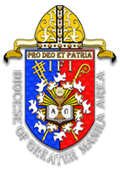LENTEN SPIRITUALITY
A Reflection for Ash Wednesday, March 2, 2022 Matthew 6: 1-6, 16-21; Isaiah 58: 1-12; 2 Corinthians 5:20b-6:10

By: The Rev. Victoria S. Esguerra
Retired Priest, Diocese of Greater Manila Area
INTRODUCTION
LENT, or “cuaresma,” from the Latin “quadragesima dies,” is the Church season consisting of the 40 days before Easter, or the time of preparation before Easter. Beginning Ash Wednesday and concluding on Holy Thursday, before the Holy Mass of the Last Supper of Jesus, the Gospels and scriptural readings are selected in relation to the themes of baptismal renewal and penance. However, over time, the theme has evolved with a penitential celebration in preparation for the observance of the Paschal Mystery before the Easter Triduum. The Paschal Triduum is significant as it covers the “three moments of the One Pasch”; Hebrew “Pascua” or “to pass over”: (1) Holy Thursday (memorial of the Supper of the new Pasch), (2) Good Friday (celebration of the Pasch of the Sacrificial Lamb), and (3) Easter Vigil (glorious “passing over” of Christ, victory over death, paschal exodus realized).
The history of Lent started during the fourth century and was rooted in the Paschal fasting of two days, Friday and Saturday before the Sunday of the Resurrection. Prolonged for a week, the fasting was extended to three weeks (Egypt), then to six weeks or 40 days. In the 350 AD, Rome already established the Lenten celebration.
The number 40 has great significance in the Bible: 40 days of flood during Noah’s time; 40 days of Moses on the mountain communing with God; 40 days in the wilderness for the Israelites in their Exodus journey; 40 days for Elijah walking towards the mountain in his encounter with the Lord, and above all, 40 days of Jesus in the wilderness when He was tempted by the Devil before His messianic mission. These were significant moments of trials, purifications, and preparations for the important coming salvific event. Hence, Lent is an important preparation for the significant Easter celebration and must be considered a memorial feast in perpetuity.
The two-fold purpose of Lent – (1) baptismal renewal or the preparation for it, and (2) penitential spirituality – prepares the faithful members of the church for the Paschal mystery and the exultant celebration of Easter, the Resurrection Day of the Lord Jesus Christ.
The ecclesial mandate in the Lenten celebration includes the preparations as biblically- grounded: (1) almsgiving, (2) fasting, (3) treasure management, and (4) prayers or piety. The Ash Wednesday readings from the Gospel according to Matthew, and scriptural readings from the Book of the Prophet Isaiah and the Epistle of St. Paul provide the specific guidelines on how to observe the Lenten Season.
ALMSGIVING
Almsgiving is the Greek word for “mercy” to the needy. Jesus taught His disciples to share their blessings and to give quietly (secretly) to the poor and needy. He warned them that to give pompously (to be seen by others) merited no reward from God the Father. The intent of the heart was more important than the amount given, as reflected in the story of Jesus about the poor widow’s offering of two copper coins which consisted of her only earnings from poverty, in contrast to the affluent people who gave generously from their abundance (Mark 12:41-44). A person’s charity is measured by what one has left for himself/herself, or judged by what one has kept back. The story of Ananias and Sapphira in Acts 5:1-4 showed how this couple was punished by death when in keeping to themselves what should have been given as charity to the community.
God loves a cheerful giver (2 Cor. 9:8-15) as giving is a proof of one’s love (1 John 3:17). The Bible cites many stories of the Jews’ caring for the poor: leaving fallen harvest for the poor (Dt. 24:19-23); giving tithes to the poor every three years (Dt. 14:28-29); sharing bread with the hungry, clothing the naked, sheltering the homeless (Isaiah 58:6-7). All these almsgivings must be done in quiet humility, sincerity, cheerfully, and generously from the heart, as these are visible to God the Father who will reward the almsgiver accordingly.
FASTING
Literally fasting is abstention from food. In the Old Testament there were two kinds of fasting: public and private. PUBLIC fasting included prayer and supplications with wearing of sackcloths for penance and mourning (2 Chron. 20:3; Ezra 8:21-23; Neh. 1:4-11; 9:1; Dan. 9:3). This was observed for one day only and offerings were made at the Temple. PRIVATE fasting was an act of penance for sickness, and for suffering when accused or scorned (Psalm 69:1-15; 2 Sam. 12:15-23).
In the New Testament, fasting is a duty and must be done with joy as it results in heavenly reward, according to Jesus (Mt. 6:16-18; Zech. 8:19). Jesus Himself fasted for 40 days and 40 nights after His baptism in the Jordan River, and was tempted by the Devil. While under extreme physical agony, He meditated (spiritually) about His forthcoming messianic mission. Fasting results in great power for ministry (Mt. 17:21) and is recommended, with prayers, for God-fearing men [people] especially when being commissioned to ministry (ordinations) (Acts 13:1-3); including the consecration of teachers and elders.
Fasting is advised for those going through severe trials as courage is needed to overcome adversities (Mk. 14:66-72; Acts 27:1-38)). For the servants of God, St. Paul advised fasting as great endurance from hardships and calamities and as weapon of righteousness – purity, knowledge, patience, kindness, holiness of spirit, genuine love, truthful speech, and God’s power (2 Cor. 5:20b-6:10). With a contrite heart and sacrifices, fasting is also for cleansing and pardon of sins (Psalm 51).
In today’s context, fasting does not only mean abstentions from food the people indulge in (e.g., bingeing on meat products, ice cream, etc.) but also refraining and/or limiting what occupies a major portion of our time (e.g., television, social media, movies, time-wasting activities); avoiding unproductive activities; and refraining from finger-pointing and repairing the “breached”.
TREASURES
What one values highly in life is measured by the amount of time one spends on it (endeavors) and/or the amount of effort/money poured into it. Generally, a treasure is something kept and accumulated through one’s effort or received through somebody’s initiative; including those gotten forcefully from others (ill-gotten wealth); or acquired through conquest (booty: King David); or gifts or donations or trades (King Solomon); or taxes and contributions to palaces and temples (Old Testament). However, Proverbs 21 says that treasures don’t last; ill-gotten wealth makes one miserable; and hidden treasures are useless (“consumed by rust” or “stolen by thieves” – Mt. 6:19). “For where your treasure is there your heart will be,” according to Jesus (Mt. 6:21).
Treasure is for the wise (Prov. 2:20); for the righteous (Prov. 15:6); for those who give alms (Tobit 4:7-9); for those who honor their parents (Eccles 13:4); and for those who seek wisdom (Prov. 8:18-21). Jesus says, “Store up for yourselves treasures in heaven… not on earth.” How is this accomplished? Again, Jesus advises: feed the hungry; quench the thirsty; clothe the naked; shelter the homeless; heal the sick; visit the prisoners; bury the dead (Mt. 25:31ff). “What you did to the least of your brethren, you did it unto Me [Jesus].” (Mt. 25:45).
PRAYERS
In the Old Testament, prayer is a conversation or dialogue between persons and God: between God and Adam (Gen. 3:9-12); between God and Abraham (Gen. 15:1-6); between God and Moses (Ex. 3:1-4:17). Prayers come in different kinds: petitions for guidance (e.g., Solomon’s wisdom), requests for divine help, intercessions, praise and thanksgiving, and confessions. They can be offered at any time and any place; but must be done with integrity, pure motives, and ethical concerns (Isa. 1:15-17).
In the New Testament, Jesus is the model and instructor of prayer. He prayed at decisive moments: in His baptism, transfiguration, Gethsemane (before His crucifixion), and during His crucifixion. After He did some healings, He left for secluded places to pray to the Father and to be rejuvenated. He gave instructions to His disciples on the correct conduct of prayer: brief and simple; not verbose; private (in one’s personal room) and not ostentatious (unlike the Pharisees who prayed at the synagogues and street corners in order to be seen and admired); must be earnest in faith and forging in spirit; addressed to God as Father. People should pray for daily needs, for healing of sickness, and for guidance in direction in life.
There are many kinds of prayers of different persons in the Bible, however, the best prayer taught by Jesus to His disciples is the “Our Father” (Prayer of Prayers or Prayer Par Excellence). Additionally, the contemporary prayer based on the classical prayer of Manasseh (composed by the repentant king of Judah while in exile) has served as the structural model in today’s prayer: A – C – T – S >>> A = Adoration, Invocation, or Ascription of Prayer to God; C = Confession of sin; T = Thanksgiving for God’s goodness and promise of mercy; S = Supplication for pardon (“knee of my heart” – indicating special depth of feeling), or Petition; Concluding Doxology “For all the host of heaven sings thy praise, and thine is the glory forever. Amen.” But nowadays the Church concludes the “Our Father” prayer with “For Thine is the Kingdom, the Power, and the Glory, forever and ever. Amen.” For other prayers, especially supplications, the conclusion is thus: “We ask this/these in the Name of the Most Holy Triune God, Father, Son, and Holy Spirit. Amen.”
CONCLUSION
As advised by the Lord Jesus Christ, this Lenten Spirituality if practiced faithfully -- inclusive of the almsgiving, fasting, proper treasures, and prayers -- strengthens one’s preparation for the observance of the Paschal Mystery. Although there is collective worship at the church which also enhances one’s personal preparations for penance, it is important that such spirituality be accompanied with Jesus’s exhortation of character traits such as integrity, humility, sincerity, kindness, compassion, generosity, endurance, forgiving nature, earnest faith, and forging spirit. If practiced as well beyond Lent, this will merit God’s heavenly reward also.


